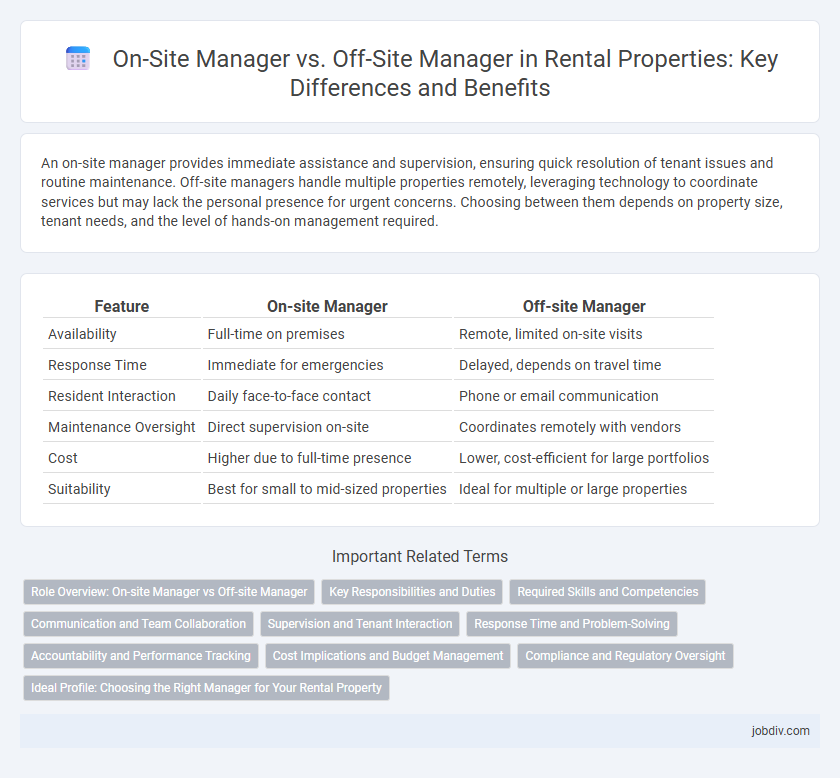An on-site manager provides immediate assistance and supervision, ensuring quick resolution of tenant issues and routine maintenance. Off-site managers handle multiple properties remotely, leveraging technology to coordinate services but may lack the personal presence for urgent concerns. Choosing between them depends on property size, tenant needs, and the level of hands-on management required.
Table of Comparison
| Feature | On-site Manager | Off-site Manager |
|---|---|---|
| Availability | Full-time on premises | Remote, limited on-site visits |
| Response Time | Immediate for emergencies | Delayed, depends on travel time |
| Resident Interaction | Daily face-to-face contact | Phone or email communication |
| Maintenance Oversight | Direct supervision on-site | Coordinates remotely with vendors |
| Cost | Higher due to full-time presence | Lower, cost-efficient for large portfolios |
| Suitability | Best for small to mid-sized properties | Ideal for multiple or large properties |
Role Overview: On-site Manager vs Off-site Manager
On-site managers directly oversee daily property operations, handle tenant relations, and promptly address maintenance issues to ensure resident satisfaction and property upkeep. Off-site managers coordinate administrative tasks, financial management, and vendor contracts remotely, providing strategic oversight without being physically present. Both roles are crucial for optimal property performance, with on-site managers emphasizing immediate, hands-on management and off-site managers focusing on long-term planning and resource allocation.
Key Responsibilities and Duties
On-site managers handle day-to-day property operations, tenant relations, and immediate maintenance issues, ensuring swift resolution and tenant satisfaction. Off-site managers focus on administrative tasks such as lease agreements, rent collection, and coordinating vendors remotely, prioritizing strategic oversight and property performance analysis. Both roles require strong communication skills, but on-site managers engage directly with tenants while off-site managers provide broader management support across multiple properties.
Required Skills and Competencies
On-site managers require strong interpersonal skills, immediate problem-solving abilities, and hands-on knowledge of property maintenance to handle daily tenant interactions and emergencies effectively. Off-site managers prioritize excellent communication skills, tech-savviness for remote monitoring systems, and robust organizational competencies to oversee multiple properties and coordinate maintenance teams from a distance. Both roles demand proficiency in leasing regulations, financial management, and customer service to ensure smooth property operations and tenant satisfaction.
Communication and Team Collaboration
On-site managers foster immediate communication and real-time collaboration by being physically present at the property, enabling quicker response to tenant issues and on-the-spot team coordination. Off-site managers rely heavily on digital communication tools such as email, phone calls, and property management software to maintain team collaboration and tenant engagement, which may introduce delays but allows for flexible oversight of multiple properties. Effective team collaboration in rental management hinges on consistent, clear communication channels tailored to the manager's location and operational workflow.
Supervision and Tenant Interaction
On-site managers provide direct supervision and immediate tenant interaction, enabling quick response to maintenance issues and fostering a strong community atmosphere. Off-site managers handle multiple properties remotely, relying on digital communication tools and scheduled visits, which may reduce their availability for spontaneous tenant needs. Effective tenant relations and property oversight often depend on the presence and accessibility of the manager on-site.
Response Time and Problem-Solving
On-site managers typically offer faster response times, addressing tenant issues immediately due to their physical presence within the property, which enhances tenant satisfaction. Off-site managers may experience delays in communication and resolution, relying on remote coordination with maintenance teams and contractors. Effective problem-solving by on-site managers often involves direct supervision and quicker decision-making, whereas off-site managers require efficient systems and technology to manage property concerns promptly.
Accountability and Performance Tracking
On-site managers provide immediate accountability through daily in-person supervision, enabling prompt resolution of tenant issues and real-time performance tracking. Off-site managers rely heavily on digital tools and remote communication, which may delay response times but offer flexible oversight and data-driven performance metrics. Effective rental property management balances the hands-on presence of on-site managers with the technology-enabled efficiency of off-site managers for optimal accountability and performance outcomes.
Cost Implications and Budget Management
On-site managers typically incur higher costs due to salaries, benefits, and on-premises office expenses, which can impact the overall budget of rental property management. Off-site managers often reduce overhead by handling multiple properties remotely, leveraging technology for efficient communication and issue resolution. Budget management favors off-site solutions where cost containment and scalable operational expenses are priorities, while on-site managers provide immediate presence that may justify higher spending in luxury or high-demand rental markets.
Compliance and Regulatory Oversight
On-site managers provide immediate compliance enforcement and can address regulatory issues in real time, ensuring prompt resolution of safety and tenant law violations. Off-site managers rely on periodic inspections and digital monitoring, which may delay identification of compliance breaches but allow for broader oversight across multiple properties. Effective regulatory oversight requires integrating on-site presence with off-site administrative support to maintain consistent adherence to housing codes and legal standards.
Ideal Profile: Choosing the Right Manager for Your Rental Property
An ideal on-site manager for rental properties possesses strong interpersonal skills, a deep understanding of property maintenance, and the ability to respond promptly to tenant concerns, ensuring high tenant satisfaction and property upkeep. An off-site manager excels in organizational skills, remote communication, and effectively coordinating third-party vendors for maintenance and emergencies, making them suitable for multiple or distant properties. Selecting the right manager depends on property size, location, and the owner's availability, balancing direct oversight with efficient operational management.
On-site Manager vs Off-site Manager Infographic

 jobdiv.com
jobdiv.com